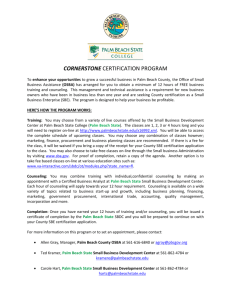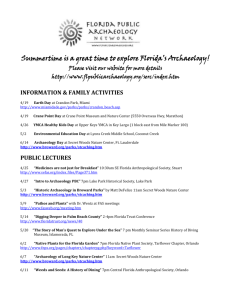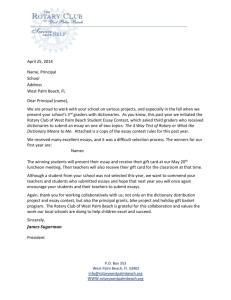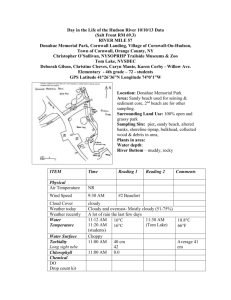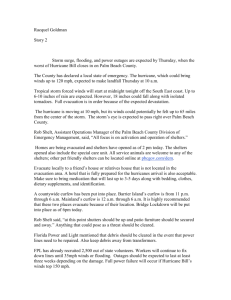Palm Beach State College - Florida Department of Education
advertisement
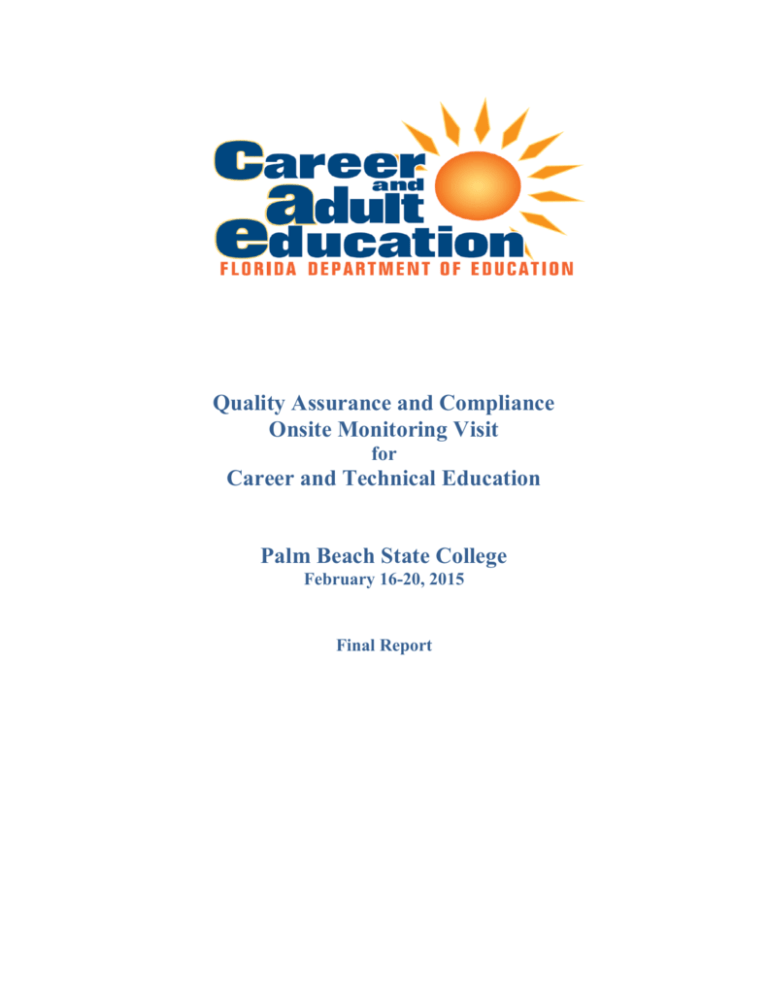
Quality Assurance and Compliance Onsite Monitoring Visit for Career and Technical Education Palm Beach State College February 16-20, 2015 Final Report State Board of Education Pam Stewart Commissioner of Education Gary Chartrand, Chair John R. Padget, Vice Chair Members John A. Colόn Marva Johnson Rebecca Fishman Lipsey <Start Text Here> Michael Olenick Andy Tuck Rod Duckworth, Chancellor Division of Career and Adult Education March 4, 2015 Dr. Dennis P. Gallon, President Palm Beach State College 4200 Congress Avenue Lake Worth, Florida 33461-4796 Dear Dr. Gallon: We are pleased to provide you with the final monitoring report for the career and technical education programs at the Palm Beach State College. The report will also be placed on the Quality Assurance and Compliance website at http://fldoe.org/academics/career-adultedu/compliance. We appreciate the leadership and professionalism demonstrated by your staff during our visit. If we can be of any assistance, please contact Tashi D. Williams, director of Quality Assurance and Compliance, at 850-245-9033 or via electronic mail at Tashi.Williams@fldoe.org. Thank you for your continuous commitment to improve educational services for Florida’s students. Sincerely, Rod Duckworth RD/sm/gpf Enclosure cc: Dr. Ginger Pedersen, Ed. D., interim-vice president, Academic Affairs Gloria Spradley-Brown, bureau chief, Grants Administration and Compliance Tashi D. Williams, director, Quality Assurance and Compliance Dr. Shahrokh Massoudi, program specialist, Quality Assurance and Compliance www.fldoe.org 325 W. Gaines Street | Tallahassee, FL 32399-0400 | 850-245-0505 TABLE OF CONTENTS I. Introduction .....................................................................................................................1 II. Authority .........................................................................................................................1 III. Quality Assurance Policies, Procedures, and Protocols ..................................................1 IV. Provider Selection ...........................................................................................................1 V. Palm Beach State College ...............................................................................................2 VI. Monitoring Activities ......................................................................................................2 VII. Results .............................................................................................................................4 VIII. Required Resolution Activities .......................................................................................7 IX. Summary .........................................................................................................................7 Appendix A – Risk Matrix ..............................................................................................8 Attachment ......................................................................................................................9 Florida Department of Education Division of Career and Adult Education Palm Beach State College (PBSC) Career and Technical Education Quality Assurance and Compliance Monitoring Report I. INTRODUCTION The Florida Department of Education (FDOE), Division of Career and Adult Education, in carrying out its roles of leadership, resource allocation, technical assistance, monitoring and evaluation, is required to oversee the performance and regulatory compliance of recipients of federal and state funding. The division’s Quality Assurance and Compliance section is responsible for the design, development, implementation and evaluation of a comprehensive system of quality assurance including monitoring. The role of the quality assurance system is to assure financial accountability, program quality and regulatory compliance. As stewards of federal and state funds, it is incumbent upon the division to monitor the use of workforce education funds and regulatory compliance of providers on a regular basis. II. AUTHORITY The FDOE receives federal funding from the U.S. Department of Education for Career and Technical Education (CTE) under the Carl D. Perkins Career and Technical Education Act of 2006. FDOE awards subgrants to eligible providers to administer local programs. FDOE must monitor providers to ensure compliance with federal requirements, including Florida’s approved state plans for CTE and adult education/family literacy. Each state shall have procedures for reviewing and approving applications for subgrants and amendments to those applications, for providing technical assistance, for evaluating projects, and for performing other administrative responsibilities the state has determined are necessary to ensure compliance with applicable statutes and regulations (34 CFR 76.770). The Florida Department of Education, Division of Career and Adult Education is required to oversee the performance of subgrantees in the enforcement of all laws and rules (Sections 1001.03(8) and 1008.32, Florida Statutes). Additional citations noting pertinent laws and regulations and authority to monitor are located in the 2014-2015 Quality Assurance Policies, Procedures, and Protocols, module A, section 1. III. QUALITY ASSURANCE POLICIES, PROCEDURES, AND PROTOCOLS The Quality Assurance Policies, Procedures, and Protocols manual was revised in the 2014-15 program year. The manual was provided to each provider prior to the monitoring visit. The manual provides a summary of each facet of the monitoring design and the process. It also contains protocols that may be used as agencies are monitored or reviewed. References may be made to the manual in this document; it is located on the division’s website at http://fldoe.org/academics/career-adult-edu/compliance. IV. PROVIDER SELECTION Various sources of data are used throughout the implementation of the quality assurance system. The monitoring component of the system is risk-based. 1 Risk assessment is a process used to evaluate variables associated with the grants and assign a rating for the level of risk to the FDOE and the division. A risk matrix, identifying certain operational risk factors, is completed for each provider. The risk matrix for each program monitored is located in Appendix A. The results of the risk assessment process and consideration of available resources are used to determine one or more appropriate monitoring strategy (ies) to be implemented. The monitoring strategy for PBSC was determined to be an onsite visit. Notification was sent to Dr. Dennis P. Gallon, President, on November 21, 2014. The designated representative for the agency was Dr. Ginger Pedersen, Interim Vice President of Academic Affairs. The onsite visit to the agency was conducted February16-20, 2015, by two representatives of the Quality Assurance and Compliance section of the division: Mr. Tashi Williams, Director Quality Assurance and Compliance and Dr. Shahrokh Massoudi, Program Specialist. V. Palm Beach State College ENROLLMENT Fiscal Year (FY) 2012 - 13 Career Technical Education 10,697 The provider was awarded the following grants for FY2012-13, 2013-14 and 2014-15: 2012-2013 CAREER AND TECHNICAL EDUCATION GRANTS Type Total Unexpended Funds Perkins- Postsecondary $884,626.00 $22,707.47 2013-2014 CAREER AND TECHNICAL EDUCATION GRANTS Type Total Unexpended Funds Perkins-Postsecondary $832,659.00 $8,357.84 2014-2015 CAREER AND TECHNICAL EDUCATION GRANTS Type Total Unexpended Funds Perkins-Postsecondary $910,496.00 N/A Additional information about the provider may be found at the following web address: www.PalmBeachState.edu VI. MONITORING ACTIVITIES The monitoring activities included pre-visit planning conference calls; an entrance conference; interviews with administrators, instructors, and students; observations; record reviews; and an exit conference. Onsite Visits Members of the team made onsite visits to the following locations: Lake Worth Campus Palm Beach Gardens Campus 2 Boca Raton Campus Entrance and Exit Conferences The entrance conference for the Palm Beach State Colleges was conducted on February 17, 2015; the exit conference was conducted on February 19, 2015. The participants are listed below: Name Entrance Conference Exit Conference X X X X Irving Berkowitz Senior Research Analyst (District) Executive Director Institutional Research & Effectiveness (District) Dean, Academic Affairs (Lake Worth) X X Gloria McAllister Program Director PSAV/CCE (Belle Glade) X X Robert Van Der Velde Jean S. Wihbey Edward Willey Associate Dean (Palm Beach Gardens) X X X X X X X X Penny McIsaac Provost (Palm Beach Gardens) Dean, Academic Affairs (Palm Beach Gardens) Dean, Health Science & Public Safety (Lake Worth) Dean, Student Services (Lake Worth) Barbara Cipriano Associate Dean, Public Safety (Lake Worth) X X Susan Caldwell Associate Dean (Lake Worth) X X Tunjarnika (Nika) Coleman-Ferrell Richard Becker David Knopp Michael Merker Danielle Goldstein Deepika Dias Prianga (Malraj) Sugathapala, Maria Vallejo Richard Reeder Dean, Academic Affairs (Boca Raton) X X VP Admin & Bus Services (District) Associate Dean, Business (Lake Worth) Tech Infrastructure Director (District) Inventory Reporting Representative (District) Grants Accountant (District) Assistant Controller Grants & Funds (District) Provost (Lake Worth) Associate Dean, Trade & Industry (Lake Worth) Dean, Business, Trade & Industry (Lake Worth) Vice President of Academic Affairs (Interim) (District) Director of Recruitment & Dual Enrollment (District) Director of Nursing (Lake Worth) Vice President, Student Srvs & Enrollment Mgmt. (District) X X X X X X Jeff Nowak Jennifer Campbell Jacqueline Rogers Patricia Richie Ginger Pedersen Robin C. Johnson Buddy Herrington Peter Barbatis Title X X X X X X X X X X X X X 3 Alex Cunningham Sheryl Platt FDOE TEAM Tashi Williams Dr. Shahrokh Massoudi Workforce Specialist (Lake Worth) Director, Massage Therapy (Boca Raton) Director, Quality Assurance and Compliance Program Specialist , Quality Assurance and Compliance X X X X X X Interviews/Observations Interviews were conducted with the administrative staff, instructional staff, program assessment specialists, and students. A minimum of two interviews and observations were completed at each site. All interviews and observations were held during the course of the visit. Records Review Program, financial and administrative records were reviewed. A complete list is provided in section VII, item G. A minimum of 10 student records were reviewed. Some policies and procedures from the agency’s website were reviewed and discussed at various times during the onsite visit. VII. RESULTS A. ADMINISTRATION refers to the management and/or supervision of programs, structure of programs and services, grant oversight, and other administrative areas. The new interim vice president for academic affairs oversees the CTE programs. o She’s very knowledgeable and experienced with CTE and apprenticeship programs. The administration is committed to student success and expansion of programs. PBSC built the educational training complex for CTE programs. In 2012, PBSC built the public safety complex with many specialized facilities. The Boca Raton campus resides on the campus of Florida Atlantic University. o Additional signage would be helpful in navigating the Boca Raton Campus. The instructors are knowledgeable and experienced with respective program areas. B. DATA AND ASSESSMENT refers to all the components of the data and assessment system, including test administration, test security, data collection, entry, and reporting, as well as procedures. The use of data in program decision-making is also explored and commented upon. A sample of students who earned industry certification and occupational completion points (OCP) in CTE program were reviewed and verified. Institutional research staff are knowledgeable with the college data collection system. Institutional research staff attends FDOE data workshop meetings annually. CTE Data is being used for program evaluation and improvement purposes. C. CURRICULUM AND INSTRUCTION refers to those elements which contribute to student learning and skill acquisition. It also addresses student and instructor observations. Instructors are following the state curriculum frameworks. Instructors are using Blackboard for attendance, grading and student evaluation purposes. The college CTE programs are exploring opportunities toward increasing the number of industry certifications earned by students. 4 The CTE programs are offering and providing community services for citizens in childcare, cosmetology, dental assisting and massage therapy programs. The college reviews and evaluates programs annually to determine program effectiveness. A variety of teaching strategies was implemented and observed during the course of the visit. D. TECHNOLOGY AND EQUIPMENT refers to a review of the technology and equipment used by students and teachers in the classroom; addresses access, availability, innovation, use and condition. The college has a $1,000 threshold for equipment. All equipment purchased with Perkins funds are tagged and were located during the review. The inventory system was exemplary and contained all elements as required by EDGAR. The college has a technology plan to update and upgrade equipment technology for all four campuses in Palm Beach County. E. LEARNING ENVIRONMENT encompasses all aspects of the physical environment where classes are held. Describing the learning environment may also attempt to capture the vision, philosophy, and character that is observed on the campus or in the classroom. Buildings are well maintained, spacious, and accessible for student use. Safety notices in classrooms and shops were appropriately posted. Classrooms are conducive for promoting learning. F. ACCESS AND EQUITY refers to compliance with the requirements of federal non-discrimination laws as relating to recruitment, enrollment, participation, and completion of programs. The Office of Equity and Civil Rights Compliance (OECR), Division of Florida Colleges is responsible for monitoring and overseeing civil rights compliance obligations. Should you have any questions or concerns, please contact the OECR at 850-245-9468. G. RECORDS REVIEW refers to a review of the records and documents that evidence compliance with federal and state rules and regulations. Samples of financial and programmatic records are reviewed. Purchases OCPs records Travel documentation Inventory Equipment purchases Financial policies and procedures Student records PBSC website Articulation agreements Advisory committee minutes Marketing brochures Time and effort reports Student industry certifications College Catalog 2014-15 5 H. FINANCIAL refers to aspects of the federal fiscal requirements that providers must meet when expending federal funds, including financial management, procurement, inventory management, and allowable costs. Project applications for Carl D. Perkins grants were reported as being timely and consistently organized. The purchasing process and samples of purchase orders was reviewed. A sample of the travel process and in-county travel was reviewed. Purchases are made under state contract guidelines and consortiums. The vice president for academic affairs has access to financial reports on a daily basis. The college is using Panther Net for accounting and financial transactions. Out of country travel must be approved by the College Board. Internal controls are comprehensive and thorough. Financial policies and procedures are in place. I. COLLABORATION refers to the collaborative agreements, partnerships, or Memoranda of Understanding (MOUs) that are in place to benefit an agency’s programs and students. CTE programs have advisory committees that are supporting their programs on all levels. The college has articulation agreements with the following: o Florida Atlantic University o Florida International University o Barry University o Broward College o Capella University o Florida Gulf Coast University o The Department of Health. The vice president for academic affairs is actively involved with the regional local Workforce Development Board. The following are some of the Business Partner Councils members: o Hospitals o Doctor offices/clinics o Hospitality o Automotive and Diesel o Machining o Massage Therapy o Cosmetology o Criminal Justice J. PROGRAM IMPROVEMENT PLAN – A Program Improvement Plan (PIP) is required when an agency does not meet 90 percent of its agreed-upon goals for individual performance measures. The purpose of the review is to determine if the strategies contained in the plan are measureable and verifiable during the visit. For 2012-13, the agency met or exceeded all postsecondary measures except for: 1. Postsecondary Certificate Level o o 2A1 Completion 5A1 Non-traditional enrollment 66.36% vs. 77.17% target 10.18% vs. 12.50% target 6 o 5A2 Non-traditional completion 44.72% vs. 60.12% target 2. Postsecondary Certificate Level o o o o 1P1 Technical Skills 2P1 Completion 5P1 Non-traditional enrollment 5P2 Non-traditional completion 34.02% vs. 44.00% target 39.00% vs. 50.00%target 22.76% vs. 27.00% target 16.72% vs. 31.99% target The PIP for postsecondary core measures for the 2012-13 Perkins grant year was reviewed with the director. Of the office Institutional Research o Steps to address these measures include informing instructors and providing guidance to improve postsecondary measures. K. STUDENT PERSPECTIVE – The team met with groups of students; their perspective is presented as a portion of this report. VIII. Comments shared by students during interview were positive. Students are appreciative and happy with their programs of study. Students appreciate the availability of classes during the day and evening as well as the locations. Students are enrolling in CTE programs based on referral and feedback by other students, friends and the College website. Students are encouraged to continue their future educational opportunities. Students are appreciative of the College effort in providing access to e-library and taking online classes. REQUIRED RESOLUTION ACTIVITIES CAREER AND TECHNICAL EDUCATION 1. Corrective Action Plan – PBSC is not required to complete a Corrective Action Plan. 2. Action Plan – PBSC is not required to complete an Action Plan. XI. SUMMARY The final report is completed, then forwarded to the agency head with a copy to the appropriate parties, and posted on the department’s website at the following address: http://fldoe.org/academics/career-adultedu/compliance. Finally, the division issues a closure notice to the agency head and designated contact person. We want to extend our appreciation to all participants during PBSC onsite monitoring visit. Special thanks are offered to Dr. Ginger Pedersen for her participation and leadership in this process. 7 Appendix A Risk Matrix for Colleges Receiving Career and Technical Education (CTE) Carl D. Perkins Grants Agency Name: PALM BEACH STATE COLLEGE Program type: CAREER AND TECHNICAL EDUCATION (CTE) Target Year: 2012-2013 Monitoring Year: 2014-2015 Metric Total CTE Budget Allocated Value # CTE Grants Value CTE PIP Index Value CTE Director Change Value CTE Funds Remaining Point Value OAG Findings Value Scaling Point Value Upper Quartile Upper Middle Lower Middle Lower Quartile 4+ 3 2 1 7.50 – 10.00 5.00 – 7.49 2.50 – 4.99 0<index<2.50 0 Yes 7 5 3 1 7 5 3 1 7 5 3 1 0 7 No 0 Upper Quartile Upper Middle Lower Middle Lower Quartile 0 Upper Quartile Upper Middle Lower Middle Lower Quartile 0 7 5 3 1 0 7 5 3 1 0 Points Assigned Weight Total Metric Points 5 X 10 50 1 X8 8 5 X8 40 0 X6 0 5 X4 20 3 X4 12 AGENCY RISK SCORE: 130 *Data sources used for calculations: Prior to July 1, 2013 8 ATTACHMENT As the oldest and most comprehensive public higher education institution in South Florida (founded in 1933), Palm Beach State College offers a curriculum that ranges from noncredit workforce programs to associate and bachelor’s degrees. The College has three Bachelor’s degree programs, the Associate in Arts degree program, 35 Associate in Science degree programs, 52 College Credit Certificate programs, 39 Vocational Certificate programs, an Applied Technology Diploma program, three Advanced Technical Certificate programs and a Certificate of Professional Preparation across four campus locations in Palm Beach County, Florida. Annual unduplicated headcount in 2013-14 was 48,240 students; full-time equivalent (FTE) was 20,321, making Palm Beach State College the seventh largest state college in Florida. Nationally, Palm Beach State College is ranked as the 8th largest producer of associate degrees in the country. The College’s economic impact on Palm Beach County is $1.1 billion. The College employees over 2,600 full-time and part-time employees. In 2013-14, over 6,000 degrees and certificates were awarded including 240 bachelor’s degrees, 3,461 AA degrees, 680 AS/AAS degrees and 1,675 certificates. Exemplary Programs Lake Worth Campus The Lake Worth campus has the most comprehensive array of career and technical programs among the college’s campuses. The Educational and Technology Center houses several medical programs such as surgical technology and medical assisting, and technical programs such as welding, automotive, diesel, HVAC, electrician, plumbing, cosmetology and machining. Specialized facilities are also dedicated to the nursing and dental health programs. Programs in computer science, business, childcare, interior design, graphic design, crime scene technology, motion picture, aeronautical science, hospitality management, construction management and human services are also at the Lake Worth campus. In 2012, the college completed the largest public safety training facility in Palm Beach County where tomorrow’s firefighters, emergency medical technicians, paramedics, criminal justice professionals, law enforcement and correctional officers receive their training with specialized facilities such as a driving range and burn tower, all located on campus. Palm Beach Gardens Campus The Palm Beach Gardens Edward M. Eissey Campus features programs that serve countywide needs in health care and the specialized needs of the growing biotechnology cluster. Sonography, radiography, respiratory care and ophthalmic medical technology serve healthcare industry needs. Palm Beach State College's Ophthalmic Medical Technology Program is the first-of-itskind in South Florida and one of only a limited number of institutions in the U.S. that offer an A.S. degree in Ophthalmic Medical Technology. It is the only ophthalmic training program to be entirely digital. The program combines classroom instruction with hands-on training in the College’s fully functional ophthalmic examination room, surgical suite and laboratory. 9 Students develop technical proficiency under the supervision of board-certified ophthalmologists, optometrists and opticians, as well as through externships in local ophthalmic practices, clinics and surgical centers. Programs in biotechnology, environmental science, landscape and horticulture management and electrical power technology provide highly skilled workers to their industries. Belle Glade Campus Palm Beach County’s western community serves as America’s winter vegetable basket. The Belle Glade campus supports its community’s workforce needs with programs in welding, heavy equipment and sugar technology. Service industries are supported with childcare and cosmetology. Boca Raton Campus Residing on the campus of Florida Atlantic University, the College’s Boca Raton campus features Palm Beach County’s only public massage therapy program. The Massage Therapy lab has state-of-the-art equipment used to train students in a wide variety of therapeutic spa treatments including Vichy, hydrotherapy baths, Reflexology, Aromatherapy, Ayurvedic Shirodhara, and Hot Stone Therapy. Graduating students consistently hold a higher pass rate than the average pass rate of other massage schools in the State of Florida and are among the highest in the nation, according to reports from the National Certification Board of Therapeutic Massage and Bodywork and the Federation of State Massage Therapy Boards. In addition, the Boca Raton campus has degrees and certificates in computer science. *** Palm Beach State College is at the forefront of providing career and technical training to Palm Beach County. The college’s programs are guided by district and campus personnel who work with local workforce leaders to ensure that the college is responsive to community and business needs. To support optimal learning, the college has invested both human and technological resources to facilitate continuous improvement in student learning. Program assessment occurs in every program and is solely focused on improvement, which is evidenced by the college’s most recent reaffirmation of accreditation which received no recommendations, a rarity in today’s accreditation environment. As part of that process, the college is focusing on improving students’ critical thinking skills, a skill set that will serve students throughout their academic and professional career. The college’s 2012-2018 Strategic Plan places special focus on improving program completion rates for students to transition them to skilled professions. 10

